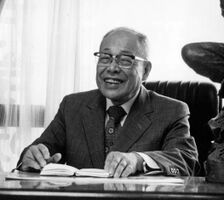Nakamura, H.: Difference between revisions
No edit summary |
m (Text replacement - "{{Footer}}" to "") |
||
| (3 intermediate revisions by one other user not shown) | |||
| Line 18: | Line 18: | ||
Nakamura was influenced by the Indian philosophy of Buddhism, Chinese, Japanese and Western thought. He made remarks on the problem of bioethics. | Nakamura was influenced by the Indian philosophy of Buddhism, Chinese, Japanese and Western thought. He made remarks on the problem of bioethics. | ||
Nakamura published more than 170 monographs, both in Japanese and in Western languages, and over a thousand articles. ([https://en.wikipedia.org/wiki/Hajime_Nakamura Source Accessed Sep | Nakamura published more than 170 monographs, both in Japanese and in Western languages, and over a thousand articles. ([https://en.wikipedia.org/wiki/Hajime_Nakamura Source Accessed Sep 7, 2021]) | ||
|PersonType=Professors; Translators | |PersonType=Professors; Translators | ||
|associatedwebsite=https://terebess.hu/zen/mesterek/NakamuraHajime.html | |||
|images=File:Nakamura Hajime Visit Matsue.jpg | |||
|yearbirth=1912/11/28 | |yearbirth=1912/11/28 | ||
|yeardeath=1999/10/10 | |yeardeath=1999/10/10 | ||
| Line 49: | Line 51: | ||
== Publications == | == Publications == | ||
Latest revision as of 14:39, 5 June 2024
| PersonType | Category:Professors Category:Translators |
|---|---|
| FirstName / namefirst | Hajime |
| LastName / namelast | Nakamura |
| MainNamePhon | Hajime Nakamura |
| SortName | Nakamura, Hajime |
| bio | Hajime Nakamura (中村 元, Nakamura Hajime, November 28, 1912 – October 10, 1999) was a Japanese Orientalist, Indologist, philosopher and academic of Vedic, Hindu, and Buddhist scriptures.
Nakamura was born in Matsue, Shimane Prefecture, Japan. In 1943 he graduated from the Department of Literature at Tokyo Imperial University on a study on "The History of Early Vedanta Philosophy" under the supervision of Prof. Hakuju Ui. In 1943 he succeeded Prof. Ui and was appointed Associate Professor of Tokyo Imperial University. He was a professor there from 1954 to 1973. After retiring from Tokyo University, he established Toho Gakuin (The Eastern Institute, Inc.) and lectured on philosophy to the general public. Nakamura was an expert on Sanskrit and Pali, and among his many writings are commentaries on Buddhist scriptures. He is most known in Japan as the first to translate the entire Pali Tripitaka into Japanese. This work is still considered the definitive translation to date against which later translations are measured. The footnotes in his Pali translation often refer to other previous translations in German, English, French as well as the ancient Chinese translations of Sanskrit scriptures. Because of his meticulous approach to translation he had a dominating and lasting influence in the study of Indic philosophy in Japan at a time when it was establishing itself throughout the major Japanese universities. He also indirectly influenced the secular scholastic study of Buddhism throughout Eastern and Southern Asia, especially Taiwan and Korea. Japan, Korea, Taiwan and recently China is the only area in which all major scriptural languages of Buddhism (Chinese, Tibetan, Sanskrit and Pali) are taught and studied by academics of Indic philosophy. Nakamura was influenced by the Indian philosophy of Buddhism, Chinese, Japanese and Western thought. He made remarks on the problem of bioethics. Nakamura published more than 170 monographs, both in Japanese and in Western languages, and over a thousand articles. (Source Accessed Sep 7, 2021) |
| YearBirth | 1912/11/28 |
| YearDeath | 1999/10/10 |
| BornIn | Matsue, Shimane Prefecture, Japan |
| associatedwebsite | https://terebess.hu/zen/mesterek/NakamuraHajime.html |
| publications |
|
| IsInGyatsa | No |
| Other wikis |
If the page does not yet exist on the remote wiki, you can paste the tag |
Full Name
Hajime Nakamura

